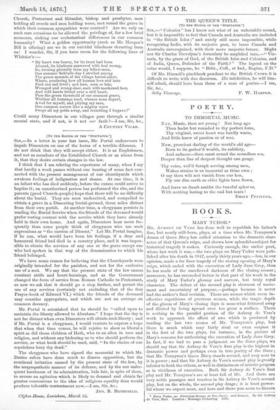[To THE EDITOR OF THE "SPECTATOR.")
a letter in your last issue, Mr. Portal endeavours to impale Dissenters on one of the horns of a terrible dilemma. I -do not think that they will accept either. It is as Englishmen, and not as members of the Established Church or as aliens from it, that they desire certain changes in the law.
I think that I am relating the experience of many, when I say that hardly a week passes without our hearing of some fact con- "fleeted with the present management of our churchyards which -awakens feelings of indignation and shame. At one time, it is an infant who has died suddenly, before the curate could arrive to baptise it; an unauthorised person has performed the rite, and the parents (good Church-people) hope that there will be no difficulty about the burial. They are soon undeceived, and compelled to -obtain a grave in a Dissenting burial-ground, three miles distant from their own parish. At another time, a clergyman persists in reading the Burial Service when the friends of the deceased would prefer resting content with the service which they have already held in their own home. And again, Dissenters hear more fre- quently than some people think of clergymen who use such expressions as "the carrion of Dissent." Let Mr. Portal imagine, if he can, what would have been his feelings, if a dear and honoured friend had died in a country place, and it was impos- -Bible to obtain the services of any one at the grave except one who had spoken in that way of the denomination to which his 'friend belonged.
We have some reason for believing that the Churchyards were originally intended for the parishes, and not for the exclusive use of a sect. We say that the present state of the law causes -constant strife and heart-burnings, and as the Government -changed the form of service from Roman Catholic to Protestant, 00 now we ask that it should go a step farther, and permit the use of any services (certainly not excluding that of the first Prayer-book of Edward VI.) which the friends of the deceased may consider appropriate, and which are not an outrage on ,common decency.
Mr. Portal is astonished that he should be "called upon to maintain the liberty allowed to Abraham." I hope that the day is not far distant when even Dissenters will obtain such liberty ; and if Mr. Portal is a clergyman, I would venture to express a hope that when that time comes, he will rejoice to show as liberal a spirit as did those children of Heth, who to an alien in race and religion, and without any bickering as to who should perform the service, or what book should be used, said, "In the choice of our sepulchres bury thy dead."
The clergymen who have signed the memorial to which Mr. Davies refers have done much to disarm opposition, but the continual irritation caused by the present state of the law, by the unsympathetic manner of its defence, and by the not unfre- quent harshness of its administration, bids fair, in spite of them, to arouse an agitation which is likely to demand and obtain far greater concessions to the idea of religious equality than would produce tolerable contentment now.—I am, Sir, &c.,


































 Previous page
Previous page